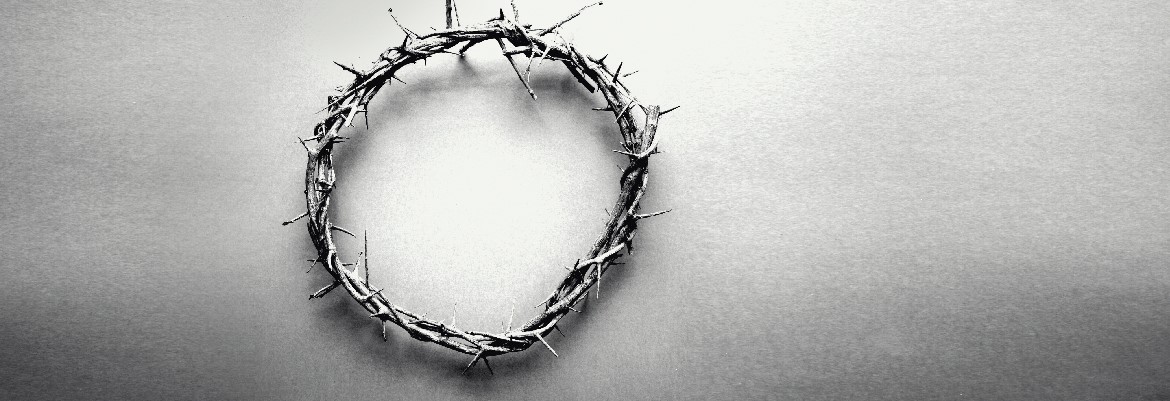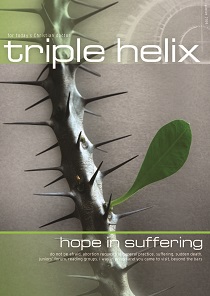Suffering has been part of the human condition since the garden of Eden. (1) Philosophers have tried to explain it, theologians have tried to understand it, ministers have preached about it, and atheists have used it to justify their position. But the eternal question remains; if God is good and all powerful, why does he allow suffering?
All of us have wrestled with that question in some form or another.
Why did a five-year-old die in a road traffic accident, leaving me as a young senior house officer in A&E to certify his death in the ambulance, and then go and break the news to his mother? Why has the 34-year-old son of a friend died of metastatic colon cancer leaving behind his young wife and three-year-old daughter? Why was the diagnosis of meningitis delayed in a friends' son, leaving him with severe disability and wheelchair bound until he died 15 years later?
All of us will have faced similar situations in our own lives or in the lives of those closest to us, not to mention the suffering witnessed from tragedies like the Aberfan disaster in 1966 or more recently, 9/11. There are also the other disasters that we read about on an almost daily basis in our newspapers and on television.
Some seem to have lost their faith as a result, while for others their faith has not only survived but matured, even when the problem has remained. In his classic book, The Cross of Christ, John Stott writes:
'The fact of suffering undoubtedly constitutes the single greatest challenge to the Christian faith and has been in every generation. Its distribution and degree appear to be entirely random and therefore unfair. Sensitive spirits ask if it can possibly be reconciled with God's justice and love.' (2)
Of course, there are partial answers, and suffering can have a positive purpose.
In his book, Long Walk to Freedom Nelson Mandela says:
'The policy of Apartheid created a deep and lasting wound in my country and my people. All of us will spend many years if not generations, recovering from that profound hurt. But the decades of oppression and brutality had another, unintended effect and it was that it produced the Oliver Tambos, the Walter Sisulus. The Chief Luthulis, the Yusuf Dadoos, the Bram Fischers, the Robert Sobukwes of our time - men of such extraordinary courage, wisdom and generosity that their like may never be known again. Perhaps it required such depths of oppression to create such heights of character.' (3)
And perhaps when we get to heaven we will be like Shasta in one of CS Lewis' Narnia stories, The Horse and his Boy, who travelling in the mist with an unseen presence by his side, describes his treacherous journey across the country and how he met so many lions upon the way, only to find that there had been one sovereign lion allowing times of comfort and suffering.
'"There was only one lion", said the Voice, "but he was swift of foot"
"How do you know?"
"I was the lion."
And as Shasta gaped with an open mouth and said nothing the Voice continued,
"I was the lion who forced you to join with Aravis. I was the cat who comforted you among the houses of the dead. I was the lion who drove the jackals from you while you slept. I was the lion who gave the horses the new strength of fear for the last mile so that you should reach King Lune in time, and I was the lion you do not remember who pushed the boat in which you lay, a child near death, so that it came to shore where a man sat, wakeful at midnight to receive you".'(4)
Yet in this life, we probably identify more with CS Lewis' experience after the death of his wife:
'When you are happy, so happy that you have no sense of needing [God]... you will be, or so it feels, welcomed with open arms. But go to him when your need is desperate, when all other help is vain, and what do you find? A door slammed in your face'. (5)
And that must have been Mary and Martha's reaction when Lazarus was seriously ill, and they sent for Jesus. Did he drop everything and rush to his bedside as we would have done? Not on that occasion. (6) We know the end result, but for about a week, the only question on their minds must have been 'Why has he not come?' Love was paradoxically combined with delay, but that love was never in doubt. Karl Barth, perhaps the greatest theologian of the 20th century, when asked to summarise all his theological learning, answered 'Jesus loves me, this I know...'. (7)
The book of Job lifts the curtain a fraction for us (although not for Job) to a God who is in control. The suffering he permits Satan to inflict on Job comes with two strict limits. First, not to touch Job himself, and second, when Job can be touched, his life has to be spared.
Job does not find the answer to his suffering, but he experiences an encounter with his Creator. His perspective is enlarged, his horizon is broadened, and his eyes are lifted away from himself to his Creator, on a trip through eternity.
'"Where were you when I laid the earth's foundation? Tell me if you understand. Who marked off its dimensions? Surely you know! Who stretched a measuring line across it? On what were its footings set, or who laid its cornerstone - while the morning stars sang together and all the angels shouted for joy?"' (8)
Job's three friends are decidedly unhelpful. They talk about God in contrast to Job who talks to God. And, in talking to God, Job, like Jesus in Gethsemane, found that the place of prayer can become the place where we wrestle, trust, accept and affirm God's ways.
Mrs Gordon-Smith experienced this after the death of her surgeon son, Ian, his wife and their two children in a road traffic accident in Thailand in 1978.
'And no one told to me, but I found out for myself, that as, in the darkest moments one threw oneself upon the Lord, time and time again and unfailingly there would be the whisper "Peace be still - and there was a great calm". And I knew that God was real that he was there and that he cared for me enough to entrust me with an experience such as this.' (9)
We may receive an affirmation of God's presence but not an explanation, an encounter but not an enlightenment. So perhaps it is more helpful to seek less for an answer that may never come this side of heaven and concentrate more on the One who came and lived and suffered and died. As Edward Shillito, a pastor and poet has described:
'The other gods were strong, but Thou wast weak.
They rode but Thou didst stumble to a throne.
But to our wounds only God's wounds can speak
And not a God has wounds, but Thou alone' (10)
or as John Stott said:
'The reasonableness of trust lies in the known trustworthiness of the object and no one is more trustworthy than the God of the cross. The cross does not solve the problem of suffering, but it gives us the right perspective from which to view it. So, we need to learn to climb the hill called Calvary and from that vantage point to survey all life's tragedies.' (11)
As Christian health professionals we all wrestle with these questions. But it is as we learn to trust God in our own sufferings, to find hope in him before anything else, to see life from his perspective as the one who suffered for us and with us on the cross, that we then can best help patients, relatives and colleagues as they grapple with the mystery of suffering.
Perhaps it is fitting to leave the final word to Charles Spurgeon:
'When we cannot trace God's hand, we can trust God's heart'. (12)
David Cranston is Associate Professor of Surgery University of Oxford and an Honorary Consultant Urological Surgeon for the Oxford University Hospitals Foundation Trust.
































